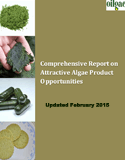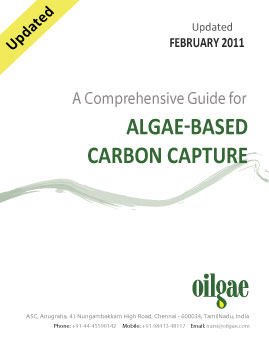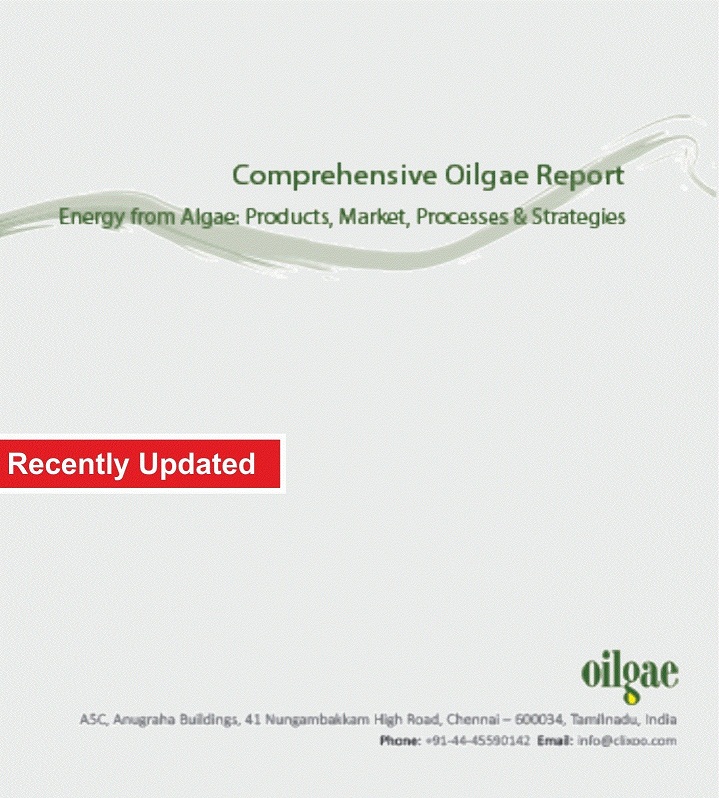Oilgae Guide to Algae-based Wastewater Treatment
Choose one of the following options |
||
| |
||
Talk to us
The Oilgae team would like to talk to you to understand how we can help you in your algae fuel efforts. If you are interested in purchasing the report or getting our help, talk to us now.
(Click here to view report)
To download a copy of the preview to your machine , click here
Download
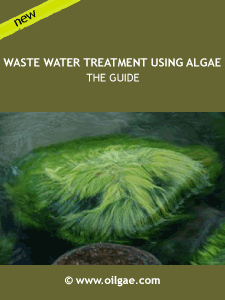
Price: US$ 1000
Pages - 556, Last Updated - March 2017
The most detailed and comprehensive guide for treating industrial and municipal wastewater using algae
- Current status and technologies used in municipal and industrial wastewater treatment
- Processes and technologies involved in algae-based wastewater treatment
- Case studies of industries using algae for wastewater treatment
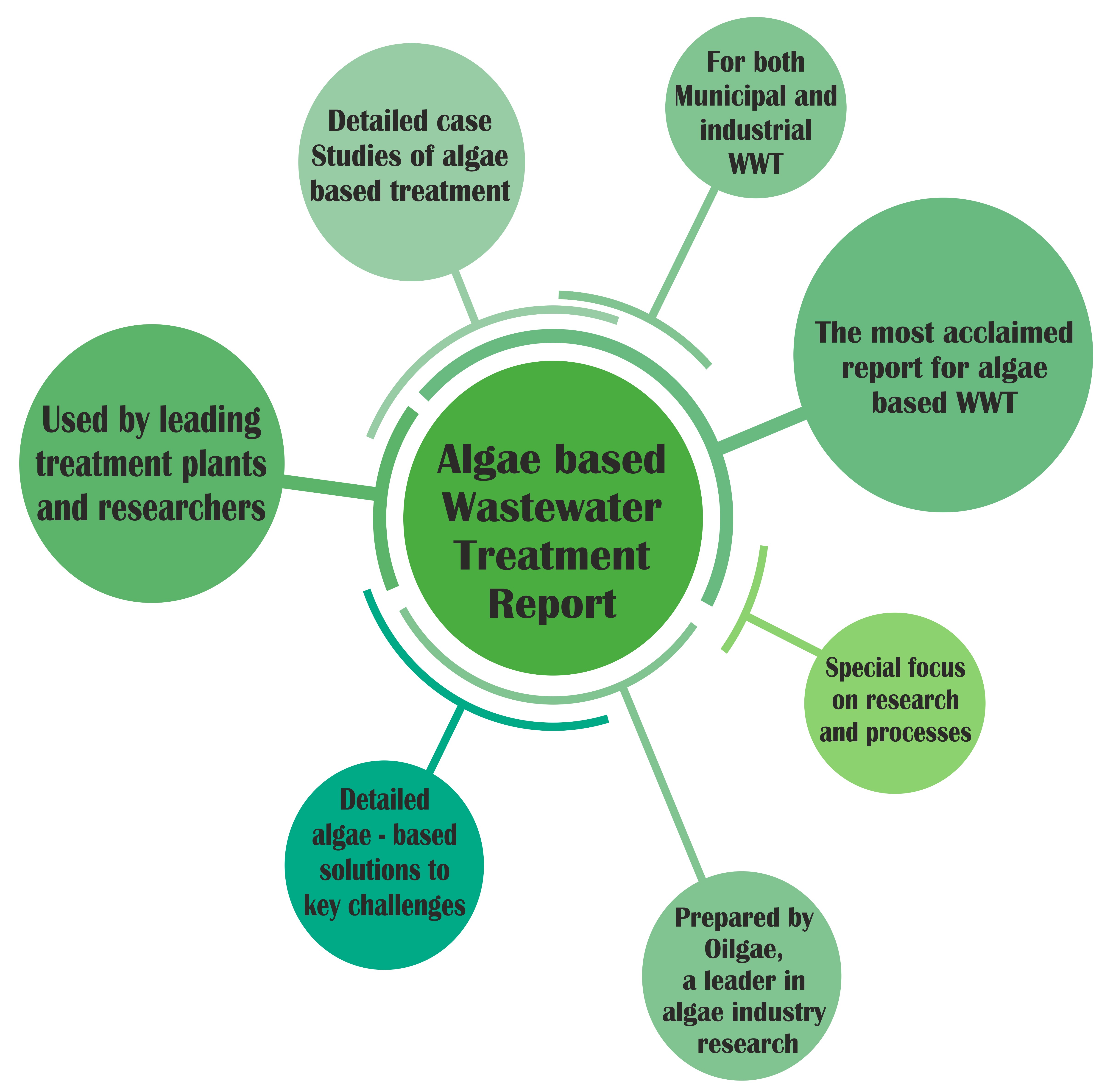
Wastewater Remediation - A Critical Problem
Bioremediation provides a sustainable solution for the treatment of industrial and municipal wastewater, a critical pain point being faced by industries and municipalities worldwide. This comprehensive report will be an indispensable tool for those keen on understanding this industry in-depth, either for research or for implementation.

Problems in Wastewater and Sewage Treatment
While a number of methods are currently being used for sewage treatment and industrial waste water treatments at sewage treatment plants (STP) and effluent treatment plants (ETP), these are very expensive methods that rely on high-cost chemicals and heavy inputs of energy. With an emphasis on sustainable wastewater treatment the world over, these industries are keen on pursuing a method that can be cost effective and can provide a sustainable, long-term solution for treatment of waste water and sewage.
Bioremediation - A Wastewater Treatment Route with High Potential
Municipalities, communities and industries the world over are keenly exploring bioremediation as an important route by which to clean up waste water. Bioremediation uses naturally occurring microorganisms and other aspects of the natural environment to treat wastewater of its nutrients. Such an avenue provides an economical and environmentally sustainable treatment method.
The report will be sent to you within one business day of payment. Report purchases made during Saturdays, Sundays and other hoildays, will be processed on the company's next business day.
Algae and Wastewater
Algae are an important bioremediation agent, and are already being used by many wastewater facilities. The role that algae can play in wastewater remediation is however much higher than its current role.
Use of algae as the bioremediation agent enables us to solve two key problems: increased use of chemicals and high energy costs. Thus, algae-based waste water treatment is a powerful avenue for sustainable wastewater treatment..
Algae-based remediation of wastewater is not without its challenges; however, the potential is so high and the problem so critical that there are a number of research efforts - both in the academia and in the commercial sector - ongoing in order to address these challenges.
Interested in Purchasing Algae-based Wastewater Treatment Report?
Send a note to muthukrishnan@eai.in
Presenting the Oilgae Guide to Algae-based Wastewater Treatment
The Oilgae Guide to Algae-based Wastewater Treatment was prepared by Oilgae (www.oilgae.com) as a response to the tremendous need in the market for a detailed resource that provided a compendium of practical data, insights and case studies for algae-based wastewater treatment efforts worldwide.
For industries and companies both large and small keen on exploring the potential of using algae for bioremediation of waste water and sewage, this comprehensive report will be an invaluable guide.
The focus of the report is to provide guidance that can facilitate actions on the part of the commercial sector and the academia. Hence, inputs and data that have been provided have a slant towards real life case studies and experiments.
This report was prepared by Oilgae, an authoritative source of information and data for the algae energy domain. The report was last updated in the first week of March 2017.
What will you know after reading this report?
The report focuses on the potential of algae waste water treatment, and provides critical inputs and expert intelligence on current efforts, bottlenecks, costs and challenges facing this vital segment.
The report comprises details of efforts being done in the field of algae-based waste water and sewage treatment. Special focus is provided on details with regard to the costs, and cultivation of strains which can thrive in waste water and sewage.
- It presents numerous case studies and examples of what the pioneers are doing in the algae waste water treatment.
- It lists companies involved in algae-based remediation of waste water and industrial effluents, commercial research, enabling students and researchers to get in touch with them for industrial collaborations.
- It showcases case studies on algae research efforts in the waste water treatment of various industrial effluents, in combination with existing bioremediation methods such as anaerobic digestion and other microbial treatment methods, and as cost-effective aeration agents in aerobic / oxidation ponds.
- It answers the most important questions that entrepreneurs, investors and businesses have regarding algae waste water treatment.
- It provides details on pathways and technologies for alternative energy products from algae grown in wastewater.
- It provides extensive details on research efforts in this domain done by universities and academia.
- It also provides insights and latest trends and technologies used in primary, secondary and tertiary stages of waste water and sewage treatment.
- It lists algae culture centers, from where students and researchers can obtain algae strains.
Specific challenges and questions for which answers are provided in the report
- What are the best strains of algae for wastewater and sewage treatment?
- At which stage of wastewater treatment are algae is introduced?
- What are the costs and economics of algae-based wastewater remediation?
- What are the differences between algae-based treatment for municipal sewage and industrial wastewater?
- What are the external nutrient requirements for cultivating algae in wastewater?
- As sewage already contains nutrient, is there any need for additional nutrients for algae cultivation in sewage, and if yes, what are they?
- What could be the environmental bottlenecks for algae-based wastewater remediation?
- Are there algae predators in sewage?
- Will toxins affect algae growth in sewage?
- What are the natural microfloras in sewage?
- What are the various end-uses to which the algae biomass from sewage and wastewater can be put to?
- Which is the best harvesting methods for algae cultivated in sewage?
- What are the future possibilities in microbe-based waste water remediation in general and microalgae-based remediation in specific?
- Is sewage and wastewater based algae cultivation for producing biofuels an attractive business opportunity?
Who Will Most Benefit from this Guide?
While a diverse range of industries will benefit from this report, specific industries that will benefit most from the report are:
- Meat and Poultry
- Pulp and Paper
- Textiles Dyeing
- Metal Finishing
- Dyes & Pigments
- Pharmaceutical
- Food & Dairy
- Biotechnology
- Starch & Cellulose
- Pesticides & Insecticides
- Chemical & Drug Formulation Units
- Fertilizers
- Photography
Insights and intelligence, not just information
Compiled by a diverse team of experts, with experience in scientific and industrial fields, the Oilgae Guide to Algae-based Wastewater Treatment is the first report that provides in-depth analysis and insights on this important field. It uses innumerable data and information from a wide variety of expert sources and market studies, and distills these inputs and data into intelligence and a roadmap that you can use.
| Price of the Algae-based Wastewater Treatment | Price in USD |
| Companies /Entrepreneurs | US$ 1000 |
People who wish to procure the report under this option are requested to send an email to muthukrishnan@eai.in with their details. Our team will get in touch with you soon |
|
If you are interested in purchasing the report or knowing more about it, please send a note to
Muthukrishnan, Email:muthukrishnan@eai.in
|
Let me help you, Write to us here., |
Talk to us The Oilgae team would like to talk to you to understand how we can help you in your algae fuel efforts. If you are interested in purchasing the report or getting our help, talk to us now. |
Oilgae Guide to Algae-based Wastewater Treatment
Section 2 - Algae for FuelsI. Concepts & Cultivation
II. Energy Products from Algae
III. Industry & Market Information
Section 3 - References
|
Key take-aways from the report:
- Composition - Wastewater is composed of domestic, municipal, or industrial liquid waste products. It is normally classified as coming from domestic sources or industrial sources.
- Business Opportunity - Remediation of industrial wastewater using algae (also called phycoremediation) presents an exciting business opportunity for companies that produce large amounts of industrial effluents.
- Bacteria-Algae Symbiotic Relationship - Microalgae ponds have been utilized for several decades for the treatment of municipal and other wastewaters, with the microalgae mainly providing dissolved oxygen for bacterial decomposition of the organic wastes. Algae and bacteria exist in a classic symbiotic relationship. Bacteria metabolise organic waste for growth and energy, producing new bacterial biomass and releasing CO2 and inorganic nutrients. Algae then utilize the CO2 through photosynthesis, assimilating the nutrients into algal biomass and releasing O2 concentration, in turn supporting the aerobic bacterial activity.
- Types of Wastewater Systems - Two types of wastewater treatment systems are currently available for algae based treatment which can be incorporated in secondary treatment stages.
- Waste Stabilisation Pond Systems ( WSPs)
- High Rate Algal Ponds( HRAP)
- Waste Stabilization Ponds - Wastewater treatment in Waste Stabilization Ponds (WSPs) is "green treatment" achieved by the mutualistic growth of microalgae and heterotrophic bacteria. WSP systems comprise of anaerobic and aerobic ponds for the removal of Biochemical Oxygen Demand (BOD), and maturation ponds for pathogen removal. The algae produce oxygen from water as a by-product of photosynthesis. This oxygen is used by the bacteria as they aerobically bio-oxidize the organic compounds in the wastewater. An end-product of this bio-oxidation is carbon dioxide, which is fixed into cell carbon by the algae during photosynthesis.
- High Rate Algal Ponds - The HRAP is a combination of intensified oxidation ponds and an algal reactor. HRAP are shallow, paddlewheel-mixed open raceway pondsand provide far more efficient wastewater treatment. Than conventional oxidation ponds, this is primarily as a result of intense algal photosynthesis providing saturated oxygen to drive aerobic treatment and assimilation of wastewater nutrients into algal biomass.
- Costs and Returns - The costs and returns from using algae-based wastewater treatment are likely to be the highest and most sustainable when simple systems such as high rate algal ponds are utilized. Higher levels of automation and technological sophistication have not so far yielded significant cost savings and financial benefits, owing to the high capital costs involved and also owing to the significant operational costs involved in terms of energy consumption and other O&M expenses.
- Beneficiary Industries - Below is the list of industries for which algae based effluent treatment plants are constructed and are operating successfully.
- Breweries
- Dairy farms
- Food Processing
- Alginate
- Textile & Leather Processing
- Drug Intermediates
- Inorganic Chemicals
- Oil Drilling
- Chemical Manufacturing
- Refineries & Distilleries
- Confectionary
- Poultry
- Fish farms
- Paper Mills
- For optimal growth, the culture must be provided with nutrients in adequate amounts. These include several macronutrients such as carbon, nitrogen, phosphorus, sulfur, potassium, (for diatoms also silicon) and a number of trace elements like minerals (e.g. Co, Mo, Mn) and vitamins (e.g. Cyanocobalamine, thiamine). Besides quantities, the right proportions among nutrients (e.g. N: P; N: Si) are also important.
- Harvesting wastewater grown algae could contribute significantly to costs. It is hence best to consider algae strains that could be easily harvested due to their characteristics (filamentous algae for instance).
- A wide range of monetizable products and processes are possible while using phycoremediation for wastewater. While some of these are monetizable all over the world (biofuels, animal feed etc.), other monetizable avenues are just emerging (nutrient credits, carbon credits etc)
- The primary harvesting processes attempted for wastewater based algae are:
- Sedimentation/settling
- Flotation
- Filtration
- Chemical Precipitation
- Algae can be used to produce many types of biofuels such as biodiesel, bioethanol , biobutanol, SVO (Straight Vegetable Oil), biogas (methane), other hydrocarbon fuel variants, such as JP-8 fuel, gasoline, etc.
- Microalgae mass cultures using wastewater can be used for efficient bioremediation while at the same time used for the production of useful products. Through the process of algae wastewater treatment very large amounts of algal biomass can be grown. In the last few years, there has been an accelerating interest in algae-based fuels. Universities and companies, both large and small, are pursuing this exciting opportunity.
Reference
Algae-Based Wastewater Treatment vs. Traditional Methods
Interesting advantages of using algae wastewater against conventional waste water treatment have been discussed in detail in the report.
Using algae has been shown to be a more cost effective way to remove biochemical oxygen demand, pathogens, phosphorus and nitrogen than activated sludge against the traditional wastewater treatment processes at ETPs (effluent treatment plants) which involves high energy costs of mechanical aeration to provide oxygen to aerobic bacteria to consume the organic compounds in the wastewater.
Oilgae Guide to Algae-based Wastewater Treatment
(Click here to view ebook)
To download a copy of the preview to your machine , click here

Algae provide an efficient way to consume nutrients and provide the aerobic bacteria with the needed oxygen through photosynthesis. Roughly one kg of BOD removed in an activated sludge process requires one kWh of electricity for aeration, which produces one kg of fossil CO2 from power generation. By contrast, one kg of BOD removed by photosynthetic oxygenation requires no energy inputs and produces enough algal biomass to generate methane that can produce one kWh of electric power.
Algae for Wastewater Treatment & Biofuels
Algae grow best off waste streams - agricultural, animal, or human. All over the world, municipalities and utilities spend enormous sums to treat wastewater and sewage and remove them of pollutants and impurities. Some of the pollutants in the wastewater and sewage are nutrients on which algae thrive. Yet another fact is that the algae that grow in human-sewage tend to have a lot of oil. Combine the above three facts and you get a rather interesting solution: Grow algae in sewage/wastewater to clean the medium while producing biofuels!
Algae, especially microalgae can bio-filter nutrient-laden, CO2-laden and low-oxygen water and turn it into oxygen-rich, CO2-low water as it flows back into the ecosystem, while simultaneously producing oil.
One of the key advantages is that, apart from the fact that expensive reactor systems are not required, unlike other algal-biofuel technologies this approach relies on "wild algae" - i.e., algae that naturally colonize sewage ponds already.
The advantage of algae-based waste water treatment is the end-product in the process - algae biomass, which can be used as a biofuel feedstock.
Given the right conditions, algae can double its volume overnight. Microalgae are the earth's most productive plants - 10 to 15 times more prolific in biomass than the fastest growing land plant exploited for biofuel production. While soy produces some 50 gallons of oil per acre per year; canola, 150 gallons; and palm, 650 gallons, algae can produce up to 15,000 gallons per acre per year. In addition, up to 50 percent of biomass for some microalgae is comprised of oil, whereas oil-palm trees - currently the most efficient large-scale source of feedstock oil to make biofuels - yield approximately 20 percent of their weight in oil.
| Plant | Yield of Biodiesel(gallons per acre) |
| Algae | 5000 and higher |
| Chinese tallow | 500-1000 |
| Palm oil | 500 |
| Coconut | 230 |
| Rapeseed | 100 |
| Soy | 60-100 |
| Peanut | 90 |
| Sunflower | 80-100 |
Oil from microalgae can easily be converted to biofuels such as biodiesel through the same technology used with oil from oil seeds which is currently used to convert vegetable oil to biodiesel (transesterification is the main conversion process). In addition, it is possible to hydro-treat the algae oil to produce other fuels such as JP-8 and other jet fuels.
The algae-based waste water and sewage treatment thus provides an interesting business opportunity - bioremediation of waste water / sewage and the simultaneous production of biofuels.
|
No of Pages : 556 Last Updated : March 2017 Price : US$ 1000 |
 |
| INSTANT DOWNLOAD: Immediately after payment you will receive an email with instructions on how to download the report | |
| Price of the Algae-based Wastewater Treatment | Price in USD |
| Companies /Entrepreneurs | US$ 1000 |
People who wish to procure the report under this option are requested to send an email to muthukrishnan@eai.in with their details. Our team will get in touch with you soon |
|
|
Talk to us The Oilgae team would like to talk to you to understand how we can help you in your algae fuel efforts. If you are interested in purchasing the report or getting our help, talk to us now. |
Drop in your details to get free white papers and regular updates on the report |



